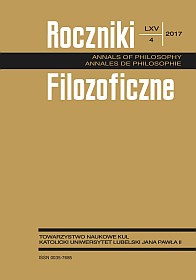Free Will and the Idea of the Last Judgement
Abstract
In his article, the author seeks to demonstrate that if there is a free will that results in good or evil, there must also be a Last Judgment, as there must be a proper settlement of the good or evil done. The existence of free will, which can produce good and evil, would be completely anomalous and pointless if there were no Last Judgment, and there are no pointless things in the world as we see it. The converse is also justified: if in the history of human cultures—in the history of religious systems since ancient times, at least from ancient Egypt—there is a belief in a court to which dying persons are subject, such a judgment only makes sense when people have free will to do good or evil. Thus, the idea of the Last Judgment supports the belief that free will exists.
References
Arystoteles. Metafizyka. Tłum. Kazimierz Leśniak. Warszawa: PWN, 1983.
Dostojewski, Fiodor. Bracia Karamazow. Tłum. Barbara Beaupré. Warszawa: Biblioteka Dzieł Wyborowych, 1913.
Hayes, Zachary J., Clark H. Pinnock i John F. Walvoord. Four Views on Hell. Grand Rapids: Zondervan, 1996.
Judycki, Stanisław. Bóg i inne osoby. Próba z zakresu teologii filozoficznej. Poznań: W drodze, 2010.
McCord Adams, Marilyn. Christ and Horrors: The Coherence of Christology. Cambridge: Cambridge University Press, 2006.
Walls, Jerry L. Heaven: The Logic of Eternal Joy. Oxford: Oxford University Press, 2002.
Copyright (c) 2017 Roczniki Filozoficzne

This work is licensed under a Creative Commons Attribution-NonCommercial-NoDerivatives 4.0 International License.





